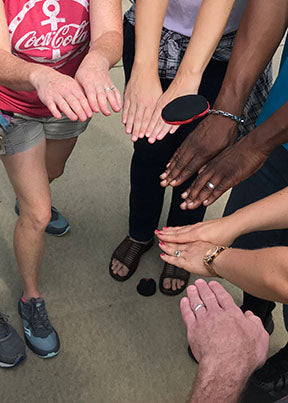The U.S. Surgeon General issued an advisory titled Protecting Youth Mental Health in December 2021. He wants each of us to take responsibility and action because, “supporting the mental health of children and youth will require a whole-of-society effort to address long standing challenges, strengthen the resilience of young people, support their families and communities, and mitigate the pandemic’s mental health impacts.”
Flop Balls can help you and your family start implementing steps the Surgeon General recommends.
#1: Take Breaks.
The first action step in the Surgeon General’s Advisory for family members and caregivers states “Be the best role model you can be for young people by taking care of your own mental and physical health.” It suggests things like taking breaks, exercising, maintaining regular routines, and taking time to unplug from technology or social media. Not just telling your kids to do it, but actually doing it yourself. Because we all know, they watch and learn.
Changing habits and routines can be a challenge. Anyone that’s a regular at a gym, knows that it’ll get busy in January for a few weeks. But only for a few weeks. So how can we create habits that we stick with? Make it playful so it’s something you want to do - take Flop Breaks!
Flop Balls are small, sand filled sacks that you toss, flip, and do other tricks with on the back of your hand. The play starts out simple, but quickly progresses to more challenging tricks. Indoors and out, solo or with family members - their flexibility makes them a great work/study break. Stand up, set a timer, move your body, and clear your mind.
When we ask people in our workshops how they feel or what they notice after a short play session, a common observation is surprise. Surprise that all of the stress and swirling thoughts crowding their minds prior to playing didn’t have their focus anymore. Paying attention to the Flop Ball in their hand got them out of their head and reconnected to their body. We also often hear words like energized, refreshed, and refocused.
#2: Connect.
The Advisory emphasizes the importance of connection in several places such as in the second and third action steps for families, “Help children and youth develop strong, safe, and stable relationships with you and other supportive adults” and “Encourage children and youth to build healthy social relationships with peers.”
I know that there are many factors affecting healthy relationships. But I’ve watched the magic of families and peer groups working on skills and playing unplugged together enough times to know that it’s a great strategy for creating and strengthening connections. Competing to see who can pass the Flop Ball back and forth successfully 10 times most quickly, passing it around a family circle while having everyone share a story as they flop, or inventing a brand new game are just some of the ways we’ve seen families and groups play together.
Whether competing, cooperating, or collaborating, you’re getting to see each other in a new way.
#3: Fail Together.
The Advisory calls for us to “Empower youth and their families to recognize, manage, and learn from difficult emotions.” Most things in life take practice to get good at them. If you try to juggle or play with Flop Balls, you’ll realize that you’re not great at it right away. The same thing goes for having conversations about our feelings. Being able to identify them, talk about them, and ask for help are all vulnerable things that take practice.
So why not give yourself and your kids opportunities to try it out in low-pressure situations? As they learn new Flop Ball tricks, you and they will drop (“flop” is in the name for a reason!) Have conversations with them about how you’re feeling when you drop. Create space for them to share what they’re experiencing. Maybe share ideas about ways to troubleshoot. Ask “what else can we try?” to move past the current roadblocks in learning.
If you see your child doing a trick that you haven’t learned yet, ask them to show you how to do it. Actually say, “I need help.” Your modeling asking for help will be powerful for them. The Advisory specifically mentions that “Youth and families should know that asking for help is a sign of strength.”
Whether you use Flop Balls or some other form of play, we hope you find ways to take breaks, connect, and fail together with your family. For their well-being and yours.



